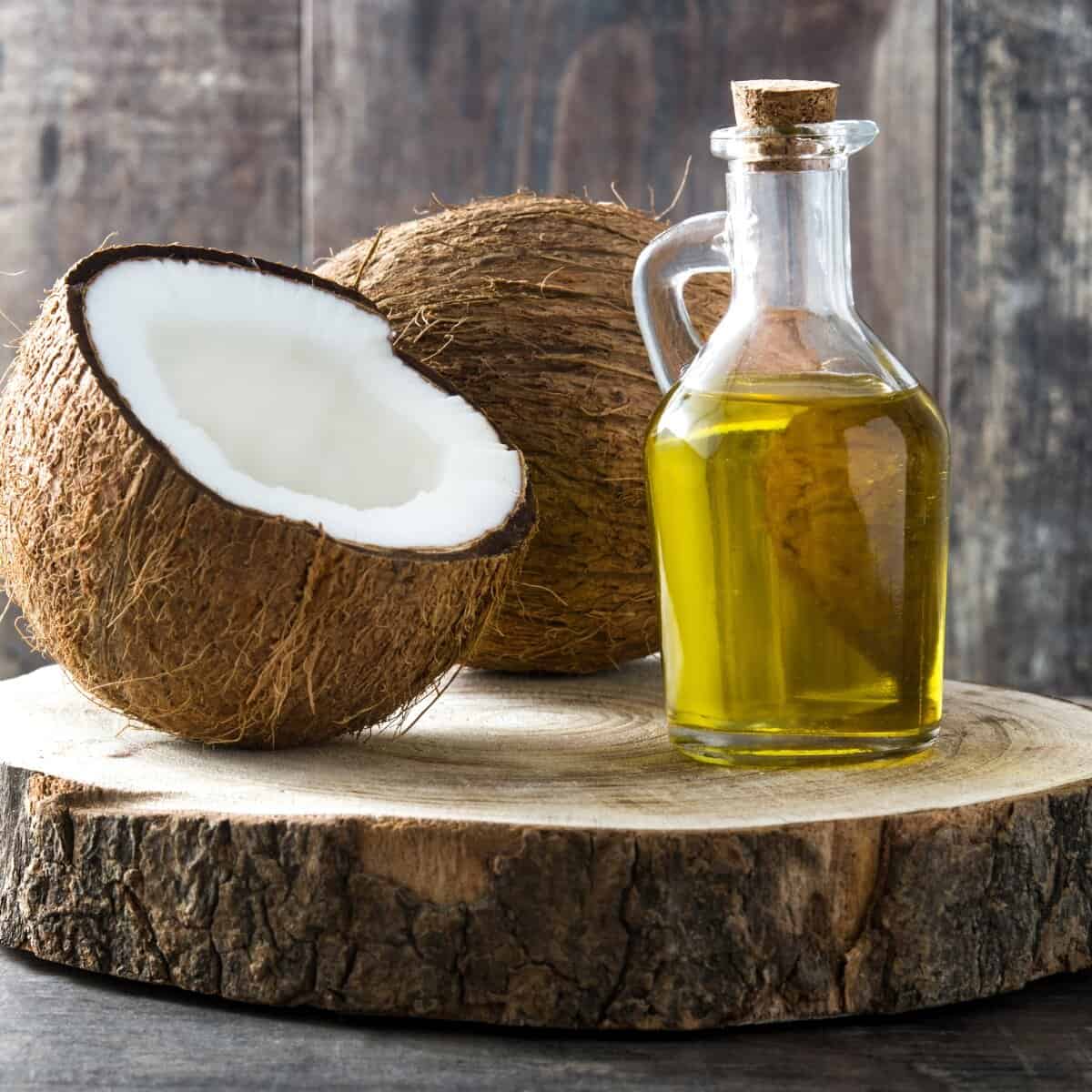Coconut Oil: The Surprising Benefits You Need to Know
Coconut oil is a great cooking oil because it’s high in saturated fat, which is great for high-heat cooking. But is it healthy?
Coconut oil or Copra oil is an edible oil extracted from the kernel or meat of matured coconuts harvested from the coconut palm (Cocos nucifera). It has various applications in food, medicine, and industry. Because of its high saturated fat content it is slow to oxidize and, thus, resistant to rancidification, lasting up to two years without spoiling. Many health organizations advise against the consumption of high amounts of coconut oil due to its high levels of saturated fat.
In this guide, I’ll tell you everything you need to know about coconut oil and whether it’s healthy or not.


Check out our new cookbook
Bitemybun's family recipes with complete meal planner and recipe guide.
Try it out for free with Kindle Unlimited:
Read for freeIn this post we'll cover:
Unlocking the Wonders of Coconut Oil
Coconut oil is a type of edible oil that is derived from the meat or kernel of mature coconuts. It is typically found in two varieties: virgin and refined. Virgin coconut oil is derived from fresh coconut meat, while refined coconut oil is made from dried coconut meat. Unlike other types of oil, coconut oil is solid at room temperature and becomes a clear liquid when heated.
Scientific Evidence to Support Health Benefits
Studies suggest that coconut oil offers multiple health benefits, including:
- Supports heart health by reducing harmful lipoprotein cholesterol levels
- Helps with weight maintenance by providing quick energy and reducing appetite
- Improves oral health by reducing harmful bacteria in the mouth
- Supports skin health by preventing dryness and applying antimicrobial properties when applied topically
- Offers hair benefits by reducing dryness and improving hair health
Types of Coconut Oil
There are two distinct types of coconut oil: unrefined and refined. Unrefined coconut oil is derived from fresh coconut meat and is typically labeled as “virgin” or “extra-virgin.” Refined coconut oil is made from dried coconut meat and is typically labeled as “pure” or “expeller-pressed.” The refining process removes impurities and makes the oil more stable for cooking.
How to Use Coconut Oil
Coconut oil has multiple uses and can be used in a variety of ways, including:
- As a cooking oil for sautéing, baking, and frying
- As a substitute for butter or margarine in recipes
- As a moisturizer for the skin and hair
- As a natural remedy for dry skin, eczema, and other skin conditions
- As a mouthwash for oral health
Putting Coconut Oil into Practice
To incorporate coconut oil into your regular routine, try:
- Adding a spoonful to your morning coffee or smoothie for a quick energy boost
- Using it as a cooking oil for a healthier alternative to vegetable oil
- Applying it topically to your skin and hair for added moisture and protection
- Using it as a natural mouthwash by swishing a tablespoon in your mouth for 10-20 minutes to prevent harmful bacteria and improve oral health
Transform Your Dishes with Coconut Oil: Tips and Tricks for Cooking with this Versatile Ingredient
Coconut oil is an excellent choice for cooking due to its high smoke point, which means it can withstand high temperatures without breaking down and producing harmful compounds. It’s also a great substitute for butter or other oils in recipes, particularly for those who are lactose intolerant or following a vegan diet. Additionally, coconut oil is rich in healthy fats, making it a suitable ingredient for those looking to maintain a balanced diet.
What Forms of Coconut Oil are Ideal for Cooking
When it comes to cooking with coconut oil, there are a few different forms to consider. Here are some helpful tips:
- Pure, unrefined coconut oil is the best choice for cooking, as it is minimally processed and maintains its natural flavor and nutrient content.
- Fresh coconut oil is also a great option, as it is made from freshly harvested coconuts and has a slightly sweeter taste than other versions.
- If you’re looking for a quick and easy option, you can also use coconut oil in block or pieces form, which can be melted down and poured into your dish.
Additional Tips and Tricks
- Coconut oil can be used in a wide range of dishes, from stir-fries to baked goods to smoothies.
- When making dishes with coconut oil, be sure to include additional ingredients that complement its flavor, such as ginger, garlic, or lime.
- Coconut oil can also be used as a substitute for butter in popcorn recipes, giving it a slightly sweet and nutty flavor.
- Highly processed versions of coconut oil may have a slightly different flavor and nutrient content than pure, unrefined versions, so be sure to read the label carefully when making your choice.
- If you find that your coconut oil has solidified, simply place the container in a bowl of warm water for a few minutes to bring it back to a liquid state.
The Nutritional Benefits of Coconut Oil
There are two main types of coconut oil: virgin and refined. Virgin coconut oil is produced using a process that involves drying the coconut flesh and then pressing it to extract the oil. This process helps to preserve the natural nutrients and flavor of the coconut oil. Refined coconut oil, on the other hand, is produced using a process that involves heating the coconut flesh to destroy any bacteria or other contaminants. This process can also destroy some of the natural nutrients and flavor of the coconut oil.
The Importance of Daily Amounts
The amount of coconut oil that you should consume each day depends on a number of factors, including your age, weight, and overall health. However, most people can benefit from adding a small amount of coconut oil to their daily diet. A good rule of thumb is to consume no more than 2 tablespoons of coconut oil per day.
The Difference Between Coconut Oil and Other Oils
The main difference between coconut oil and other oils is the type of fat that it contains. Coconut oil is high in saturated fats, but these fats are different from the saturated fats found in other oils. Coconut oil contains medium-chain triglycerides (MCTs), which are a type of healthy fat that the body can easily convert into energy. Other oils typically contain long-chain triglycerides (LCTs), which are harder for the body to convert into energy.
In conclusion, coconut oil is a great addition to any healthy diet. It is rich in nutrients and healthy fats that can help improve your overall health. Whether you choose virgin or refined coconut oil, be sure to consume it in moderation and as part of a balanced diet.
Conclusion
So, that’s what coconut oil is – a delicious edible oil derived from the meat of mature coconuts. You can use it for cooking, moisturizing your skin and hair, and even as a natural remedy for oral health. Plus, it’s a great substitute for butter in recipes, especially for lactose intolerant people following a vegan diet. So, go ahead and add some coconut oil to your life!
Check out our new cookbook
Bitemybun's family recipes with complete meal planner and recipe guide.
Try it out for free with Kindle Unlimited:
Read for freeJoost Nusselder, the founder of Bite My Bun is a content marketer, dad and loves trying out new food with Japanese food at the heart of his passion, and together with his team he's been creating in-depth blog articles since 2016 to help loyal readers with recipes and cooking tips.
